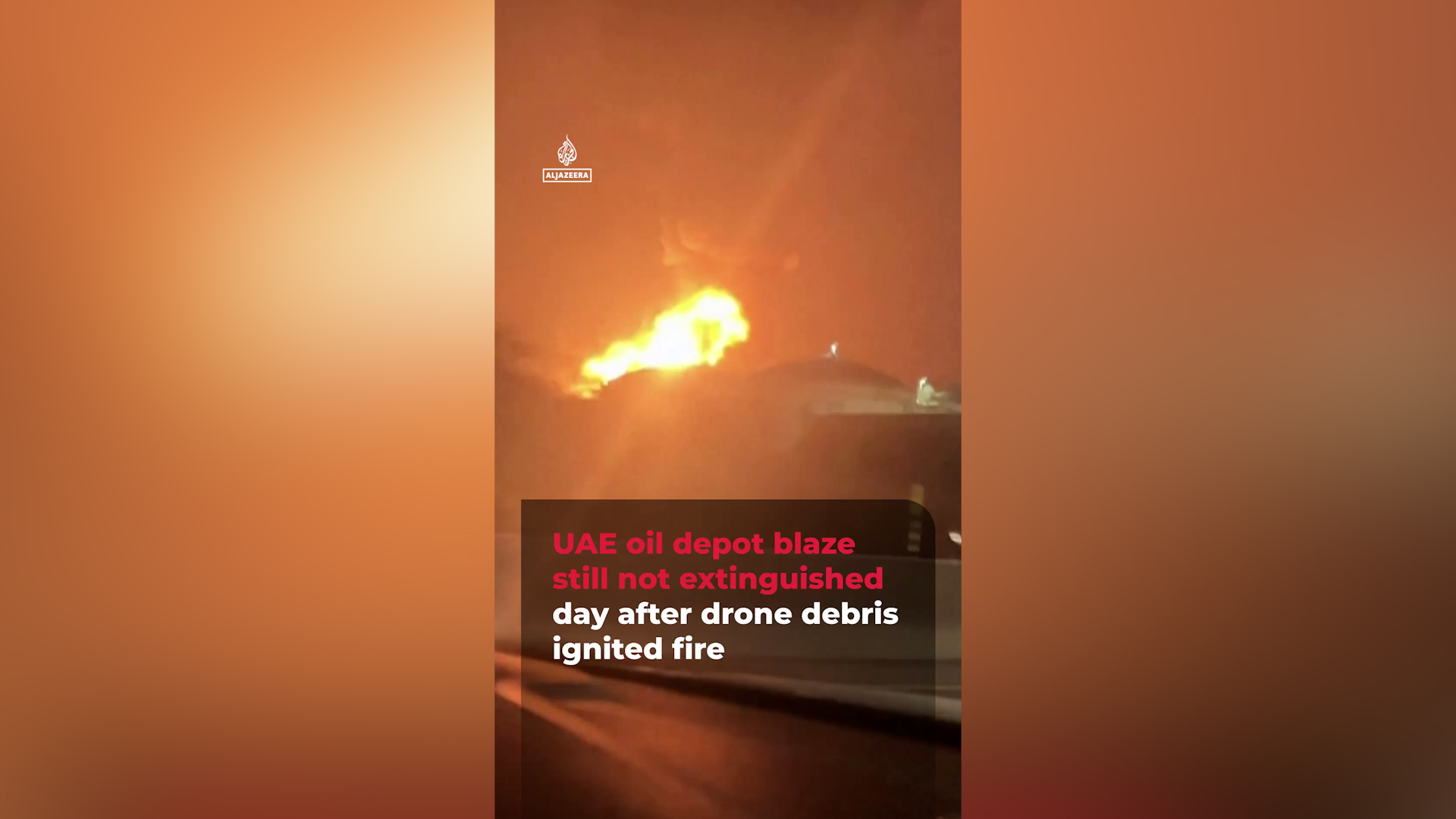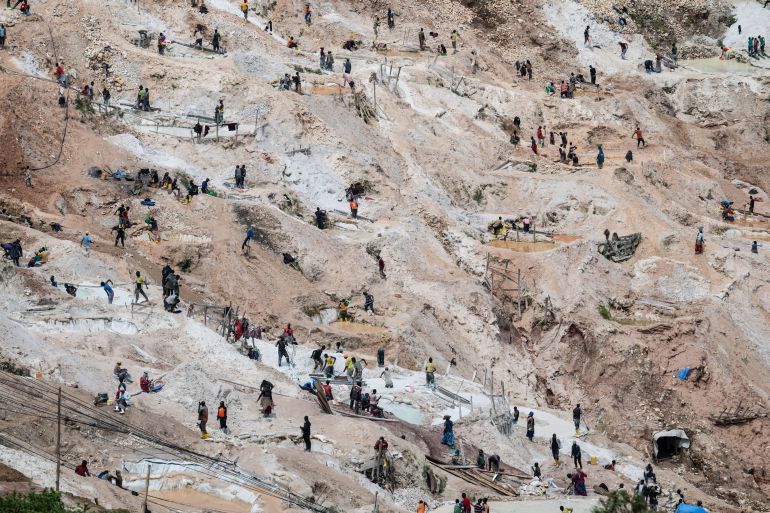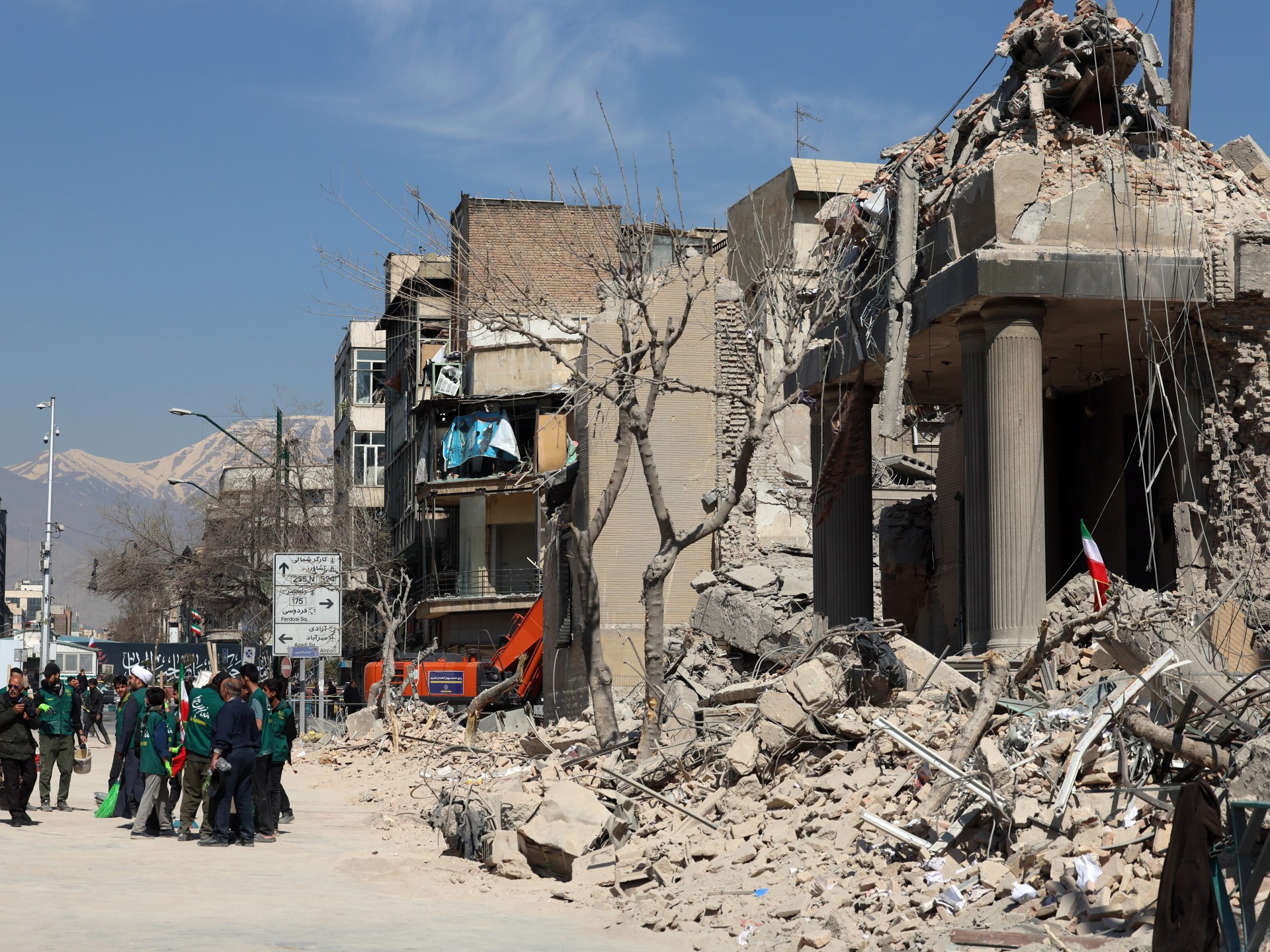Footage shows a huge fire still raging at an oil depot in Fujairah, UAE a day after falling debris from an intercepted drone ignited the blaze.
UAE oil depot fire still raging day after drone sparks blaze


Footage shows a huge fire still raging at an oil depot in Fujairah, UAE a day after falling debris from an intercepted drone ignited the blaze.

A landslide triggered by heavy rains has killed more than 200 people at the Rubaya coltan mine in the eastern Democratic Republic of the Congo, authorities said.
DRC’s Ministry of Mines said on Wednesday that about 70 children were among the victims, and others who were injured were evacuated to medical facilities in the city of Goma, the capital of North Kivu province.
list of 3 itemsend of list
Fanny Kaj, a senior official in the M23 rebel group, which controls the mines, disputed the government figure and said that the collapse was caused by “bombings” and only five people had been killed.
“I can confirm that what people are publishing is not true. There was no landslide; there were bombings, and the death toll isn’t what people are saying. It’s simply about five people who died,” Kaj said.
Ibrahim Taluseke, a miner at the site, said that he had helped to recover more than 200 bodies from the area.
“We are afraid, but these are lives that are in danger,” Taluseke told The Associated Press news agency. “The owners of the pits do not accept that the exact number of deaths be revealed.”

A senior official from the AFC (Congo River Alliance)/M23 Rwanda-backed rebel group, which has controlled the mine since 2024, told the Reuters news agency that “continued operation had been discouraged” at the site.
“Pending the securing of the area and the implementation of protective measures for miners. The incident is due to the heavy rains of the last few days,” the official said.
A similar collapse at the site in late January following heavy rainfall killed more than 200 people. At the time, Congolese authorities blamed the incident on the rebels and said that they were allowing illegal mining without sufficient safety standards.
Rubaya produces about 15 percent of the world’s coltan, an essential metal that is processed into tantalum and in high demand by manufacturing industries to make mobile phones, computers, aerospace components and gas turbines.

Manchester United manager Michael Carrick says defeat to 10-man Newcastle “hurts a lot” and he is “bitterly disappointed” after the 2-1 loss at St James’ Park in the Premier League.
MATCH HIGHLIGHTS: Newcastle United 2-1 Manchester United

Pep Guardiola’s Manchester City have blinked first in the Premier League title run-in as they stumbled to a draw against Nottingham Forest.
City led twice through Antoine Semenyo and Rodri against relegation-threatened Forest but failed to see out the game and now lie seven behind leaders Arsenal.
Guardiola’s men have a game in hand against Crystal Palace but this could be a gameweek where the momentum and belief swings in the direction of Mikel Arteta’s men.
City had 70% possession and 21 shots but their inability to hold on to a lead could prove crucial come May, as they have now dropped a whopping 13 points from winning positions this season.
“It is a lot but there are games that maybe we didn’t deserve it but today we played, in general, good for 90 minutes,” said Guardiola. “You have to stop transitions, long balls you have to defend but it’s not about this action or that action, in general the game was well played.
January signing Semenyo has hit his stride quickly at City and looked like being a difference-maker in the title race after his winner at Leeds United on Saturday.
Against Forest, he scored his seventh goal since arriving from Bournemouth to give City a 1-0 advantage at half-time.
But a familiar story then unfolded. The statistics show City have dropped off in the second half of matches – had games finished at half-time, Guardiola’s side would sit 13 points clear of Arsenal but instead find themselves seven points adrift.
Forest had twice fallen behind but managed to hit back through Morgan Gibbs-White’s superb instinctive backheel and Elliot Anderson’s stunning curling effort.
The reaction from the City players at full-time was telling, heads bowed and shoulders slumped in the knowledge that these were two crucial points dropped.
“I would like to concede fewer but it’s not about analysing one specific action,” said Guardiola. “I never point fingers at my players. We did everything.
“We had the chances at the end and in the first half and the momentum. But something always happens and we could not win.”
Arsenal kicked off at the same time as City on Wednesday and capitalised by scraping a 1-0 victory at Brighton.
“Arsenal can keep playing badly and winning all they like – it’s the others that are faltering,” former England goalkeeper Rob Green said on BBC Radio 5 Live.
Leading 2-1 in the second half, City’s star striker Erling Haaland ran through on goal and went down after contact with Nottingham Forest goalkeeper Matz Sels.
Referee Darren England did not award a penalty and video assistant referee Tony Harrington felt there was no need to overturn the decision.
It left City captain Bernardo Silva questioning the officials, telling TNT Sports: “We are used to this [happening] this season. All the 50-50s have gone against us.
“The Erling incident – for me it is a penalty. What can Erling do? This season we are used to it. We know how it works.
“Our job is to be better. These things we cannot control. What we can control is our own performances. That is what we must focus on.”
Guardiola was not getting drawn into a discussion on the incident, adding: “I spoke weeks ago about that subject.
“I always believe that we have to do it much better so the officials don’t intervene. It’s our responsibility to do it better, we don’t have to rely on them.
What information do we collect from this quiz?

Newcastle’s match-winner William Osula talks about how he practised in training the exact finish that gave the Magpies their 2-1 Premier League win over Manchester United at St James’ Park.
WATCH MORE: Newcastle 2-1 Manchester United

Israel has carried out air strikes targeting security forces across Iran on the fifth day of the US-Israeli assault, as the death toll surpassed 1,000 and Iran launched more counterattacks and warned of the destruction of military and economic infrastructure across the Middle East.
Israeli attacks on Wednesday struck the country’s capital Tehran, the holy city of Qom, western Iran and across Iran’s central Isfahan province, according to the country’s Tasnim news agency. The attacks also damaged residential units, the agency added.
list of 3 itemsend of list
Israel said it hit buildings belonging to the Basij, a volunteer police paramilitary force of the Islamic Revolutionary Guard Corps (IRGC), as well as targeting buildings associated with Iran’s internal security command.
The death toll since the US-Israeli assault began on Saturday has reached 1,045, Iranian state media reported.
Reporting from Tehran, Al Jazeera’s Mohamed Vall said civilians are bearing the brunt of these attacks, and noted that the country is under fire from every direction.
“There is a continuous, sustained campaign across the country that is not sparing any region, city or area,” he said.
“But we know 300 children and adolescents have been hospitalised … with more than 6,000 [people] wounded,” he added.
Meanwhile, the International Atomic Energy Agency (IAEA) said damage due to attacks was also visible at two buildings near the Isfahan nuclear site, but there has been no damage to facilities containing nuclear material and no risk of radiological release.
As explosions rocked the country, plans to hold a funeral ceremony for the country’s Supreme leader Ayatollah Ali Khamenei were postponed.
Iran’s Tasnim news agency quoted an official citing logistical issues for the delay in the ceremony, which had been due to begin late on Wednesday and last for several days.
Funeral arrangements are ongoing and are expected to draw huge crowds, and, with them, the potential threat of US-Israeli attacks on a gathering of mass mourning. Some 10 million people attended Ayatollah Ruhollah Khomeini’s funeral in 1989.
Khamenei was killed early on Saturday in the first wave of the United States and Israeli assault, which also killed other senior Iranian officials, including the country’s Defence Minister Amir Nasirzadeh.
In response, Tehran has launched retaliatory missile and drone strikes against Israel and US military bases across the Gulf region.
While Israel, the US and Gulf countries have intercepted most of these missiles, some have struck military assets and civilian infrastructure. Debris from those intercepted has also fallen on some civilian areas.
Following the death of Khamenei, senior Iranian officials are working to elect his replacement, with potential candidates ranging from hardliners to reformers.
Ayatollah Ahmad Khatami, a senior Iranian religious leader who is a member of both the powerful Guardian Council and Assembly of Experts, said the country was close to choosing the late Khamenei’s successor.
“The Supreme Leader will be identified at the closest opportunity. We are close to a conclusion; however, the situation in the country is a war situation,” Khatami told state TV.
No official announcement has been made by local authorities, but Israeli and Western media outlets have reported that Mojtaba Khamenei, a hardline Muslim leader, is the frontrunner to become the new supreme leader of the 47-year-old Islamic Republic.
The Israeli defence minister threatened whoever Iran picks to be the country’s next supreme leader.
“Every leader appointed by the Iranian terror regime to continue and lead the plan to destroy Israel, to threaten the United States and the free world and the countries of the region, and to suppress the Iranian people – will be a target for elimination,” Israel Katz wrote on X.
US President Donald Trump, who has suggested the conflict could last several weeks, said on Wednesday that the leadership in Tehran is now in disarray.
“We’re in a very strong position now, and their leadership is just rapidly going. Everybody that seems to want to be a leader, they end up dead,” Trump said.
As the US, Israel and Iran continue trading fire, the United Nations has said that between February 28 and March 1, an estimated 100,000 people fled Tehran due to the conflict.
On Wednesday, Iran’s Foreign Minister Seyad Abbas Araghchi slammed Trump, saying he had “betrayed diplomacy and Americans who elected him”.
“When complex nuclear negotiations are treated like a real estate transaction, and when big lies cloud realities, unrealistic expectations can never be met,” he said in a post on X.
“The outcome? Bombing the negotiation table out of spite.”
Later on Wednesday, the US Senate voted against a resolution to curb President Trump’s ability to wage war on Iraan.
But Trump will face increasing domestic scrutiny as the war on Iran continues, while Israel will likely enjoy more long-term public support, Paul Musgrave, an associate professor of government at Georgetown University in Qatar, told Al Jazeera.